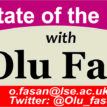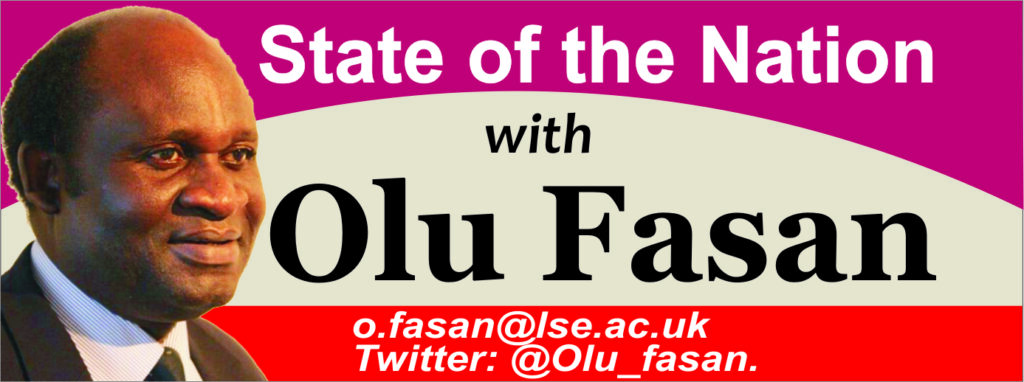

TODAY, December 31, Nigeria joins the rest of the world to say good riddance to 2020, a year eviscerated by COVID-19. A recent TIME magazine cover says: “2020 Cancelled: The worst year ever”! Of course, 2020 is the year of Nigeria’s 60th independence anniversary, and of my 60th birthday. So, I won’t dismiss it as a lost year. That said, it’s truly an annus horribilis.
But 2020 is also a year that tested the effectiveness of governments worldwide; a year that exposed governments’ abilities or otherwise to be effective problem-solving and progress-creating agencies. Some fared well, others came a cropper. Nigeria is in the latter category. It lacks the basics of effective government!
By effective government, I’m not referring to a government’s ability to stop the spread and mortality rate of COVID-19. On those measures, only a handful of countries cover themselves in glory, most don’t. What with 81,879,397 cases and 1,785,951 deaths worldwide, as of December 29, 2020, according to Worldometer! Without vaccines and individual responsibility, no government can control the mutating COVID-19, so government effectiveness can’t be about tackling it.
Rather, it’s about state capacity for essential functions. For instance, can a government provide effective relief to its citizens during the pandemic? Can it deliver quality public services? Can it prevent, or respond sensibly to, political and social crises, including insecurity? According to the World Bank, these factors are among those countries are evaluated on in relation to government effectiveness.
Why does government effectiveness matter? Well, it matters because, among other benefits, effective governments tend to have higher levels of economic growth, better educational and healthcare systems, lower levels of poverty and economic insecurity and, with legitimacy in the eyes of most citizens, lower security threat from organised non-state violence, such as terrorism and banditry.
Sadly, Nigeria fails the government-effectiveness test. It lacks the basic elements of effective government. Indeed, more scarily, it’s a fragile state. According to the 2020 Fragile State Index, compiled by Fund for Peace, FFP, Nigeria ranked 14th out 178 countries, meaning that this country is the 14th most fragile state in the world. It beats only countries like Yemen, Somalia, Syria and Afghanistan, and performs woefully on the cohesion, economic, political and social indicators!
But, as I have said many times in this column, Nigeria may also be teetering on the brink of state failure. When the Financial Times made the same point in its editorial last week, saying “Nigeria is at risk of becoming a failed state”, the government was up in arms. But the FT simply judged Nigeria by global standards. The definition of state failure, according to the World Bank, is “the risk that a state is unable exclusively to ensure law and order, and the supply of basic goods, such as food, water, infrastructure and energy, or is unable to respond to or manage current or likely future emergencies.”
ALSO READ: Nigerians harbor too much hatred to handle guns — Ogundokun
Think of that definition: can anyone honestly and objectively look at Nigeria without concluding that even if it’s not yet a failed state, it risks becoming one? I mean, once a country is already a fragile state, which Nigeria is by international standards, what does it take, without effective government, for it to become a failed state? Little, if you ask me!
Let’s consider the evidence. Take the ravaging insecurity. Is President Muhammadu Buhari’s government really in control of law and order in this country? The answer must be no. Truth is, the government has lost total control of the security situation, and its only means of dealing with terrorists and bandits is through negotiations and payments of ransoms. For instance, despite the government’s denial, most people, especially internationally, believe ransoms were paid for the release of the 344 Kankara schoolboys kidnapped by Boko Haram bandits.
But the basic feature of state legitimacy is that a state has monopoly on the use of organised violence within its territory. Without that monopoly of violence, we are in the territory of state fragility or, even, state failure. When, recently, President Buhari said only God can secure Nigeria’s borders, what territory do you think Nigeria is, or risks falling into?
Or when President Buhari refuses to replace the patently underperforming service chiefs, whose tenures have long expired, on the ground that the continuity of leadership is critical for success, which remains elusive, where are the elements of effective government, such as competence of government functionaries, civilian or military, and effective political leadership? Truth is, Buhari runs an utterly inept government, with a cabinet of entirely career politicians and an unreformed, inefficient civil service that can’t get anything done!
I mean, take the delivery of public services. How efficient is it? Leave aside the chronic inability to provide basic goods, such as water, electricity, good public schools and good public healthcare, what about the disgraceful failure to distribute the so-called palliatives to poor Nigerians who badly needed them during the shoddy COVID-19 lockdowns?
The UK government spent over £85bn to keep 11.5m people in employment by paying their wages while they stayed at home during the lockdowns. By contrast, the Nigerian government imposed lockdowns without protecting jobs or even providing basic relief to the poor. Most of the “palliatives” for poor Nigerians were found locked up in several warehouses during the recent #EndSARS riots. That’s an utter failing of state delivery.
Finally, take another factor of government effectiveness: the ability to respond sensibly to public crises. Well, with the government-ordered brutal military clampdown on the peaceful #EndSARS protests, Nigeria fails that test too.
In early January this year, I wrote a piece titled “Nigeria plumbed the depths of misrule in 2019. Never again!” (Vanguard, January 2, 2020). Sadly, with the Lekki shootings and other abuses of power, and with the several failings of state capacity discussed above, Nigeria plumbed the same depths this year. Well, I can only repeat the same refrain: Never again!
Wishing everyone a happy and prosperous 2021!
The post 2020: Another year of utter lack of government effectiveness in Nigeria appeared first on Vanguard News.
https://ift.tt/2JAYwx8 by Emmanuel Okogba via Vanguard News Albert Einstein Fools of Fortune
Comments
Post a Comment